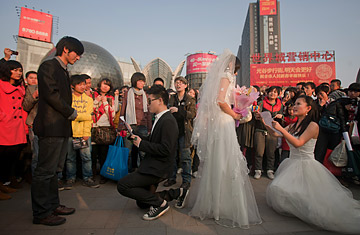
Two gay couples hold a ceremonial wedding at a shopping plaza to raise awareness of gay marriage in Wuhan, Hubei province, China, on March 8, 2011

This post is in partnership with Worldcrunch, a new global-news site that translates stories of note in foreign languages into English. The article below was originally published in Economic Observer.
After he left Tianjin last year, Zhang Xiaobai realized that homosexuals are not "rare birds."
When he was still in primary school, Zhang (not his real name) found that he was attracted to boys. Particularly after each physical-education class, when he looked at the sweat-soaked back of a boy he liked, he felt dazed. The feeling got stronger when he entered high school and fell secretly amorous of a tall and strong classmate. He was always eager to approach him and became fascinated with the occasional moment of physical contact.
That was in the mid-1990s, when the term homosexuality was far from ordinary in Chinese people's life. Zhang couldn't find anyone similar to him, and he thought he was strange. He couldn't tell his parents, sure that they wouldn't be able to understand. "I was trying to hide it from everybody. Nobody told me this is normal," Zhang recalls. "I felt like I was sick."
After graduating from university, family and friends were enthusiastic to fix him up with a girl. He didn't know how to refuse and finally yielded to the pressure, marrying a girl his parents liked. He was hounded by feelings of guilt and inadequacy. "But if I can't possibly love her, I can at least try my best to be a good husband," he says he told himself. So as not to disappoint his parents, Zhang and his wife had a son right after being married.
Each Valentine's Day and on their wedding anniversary, Zhang would buy his wife flowers and gifts, trying to compensate materially for his missing heart.
Life went by. Nothing changed for more than 10 years. And then he started logging into the online world where gay Chinese interact. In some chat forums, people wanted to meet him, but he never accepted the invitation.
In 2009 Zhang took a work trip to Beijing. One night, after leaving a bar, he saw another bar at the other side of the road. He has seen the name so many times in a forum, a "shrine" for homosexuals, like Dongdan Park, said to be the biggest gathering place in the world for gays.
He knew there were similar places back in Tianjin but thought it was too risky that he might bump into acquaintances in those spots.
The next day, he went to the bar without letting his colleague know. The atmosphere was relaxed. Like at other bars, there were people trying to strike up conversation and flirting. For the first time in his 30 years of life, he was not denying his identity. He talked to all kinds of people from different professions. There were company employees, lawyers and a lot of media people.
In comparison with the digital world, the live encounter with other gays was a shock to him. When he finished his mission and went back to Tianjin, he was determined to leave his job. He told his family he wanted to look for advancement in Beijing. Nobody understood why. He just told them, "I'm already 30-something. It will be too late if I don't think for myself."
